You can easily make a range of adaptogenic teas at home that support your well-being. Try an Ashwagandha and Chamomile blend for relaxation or a Rhodiola Rosea Lemon tea for an energy boost. For a invigorating option, brew Holy Basil and Mint or Tulsi and Ginger for mood enhancement. If you're looking to unwind, enjoy a soothing Reishi Mushroom Chai. Maca and Cinnamon creates a cozy ritual, while Schisandra Berry iced tea offers unique flavors and antioxidants. Each blend delivers its own benefits, and there's plenty more to explore.
Ashwagandha and Chamomile Blend
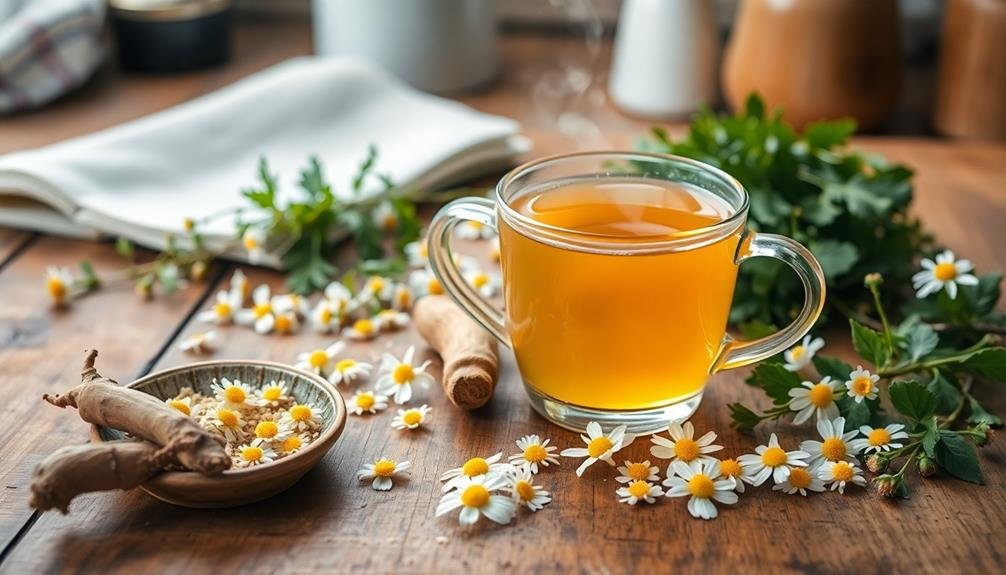
When you're looking to unwind after a long day, an Ashwagandha and chamomile blend can be your perfect companion. This soothing tea combines the calming properties of chamomile with the stress-reducing benefits of Ashwagandha, making it ideal for relaxation.
To make this blend, start with one teaspoon of Ashwagandha powder and one chamomile tea bag or one tablespoon of dried chamomile flowers. Boil two cups of water and pour it over the chamomile and Ashwagandha in a teapot or a heat-resistant container. Let it steep for about 10 minutes, allowing the flavors and benefits to infuse.
Once steeped, strain the tea into your favorite mug. You can sweeten it with honey or add a splash of lemon if you like. Sip it slowly, letting the warm liquid soothe your senses.
This tea not only helps reduce stress but can also promote better sleep, making it a great choice for evening relaxation.
Incorporating this Ashwagandha and chamomile blend into your nightly routine can help you disconnect from the day's chaos, providing a peaceful moment just for you. Enjoy the calming embrace of this delightful tea.
Rhodiola Rosea Lemon Tea
Sipping on Rhodiola Rosea lemon tea can be an invigorating way to boost your energy and enhance your mood. This adaptogenic tea harnesses the benefits of Rhodiola Rosea, a powerful herb known for its ability to reduce stress and fatigue.
By combining it with fresh lemon, you'll not only elevate the flavor but also add a dose of vitamin C, which supports your immune system.
To make your own Rhodiola Rosea lemon tea, start by boiling water. Once it's ready, add about one teaspoon of dried Rhodiola Rosea root. Let it steep for 10-15 minutes to extract the herb's beneficial compounds.
After steeping, strain the tea into your favorite mug. Squeeze the juice of half a lemon into the tea, stirring well to blend the flavors.
Feel free to sweeten your drink with honey or maple syrup if you like. Enjoying a cup of this tea in the morning can help you kick-start your day, while sipping it in the afternoon can provide a revitalizing pick-me-up.
With its uplifting properties, Rhodiola Rosea lemon tea can be a delightful addition to your daily routine.
Holy Basil and Mint Infusion
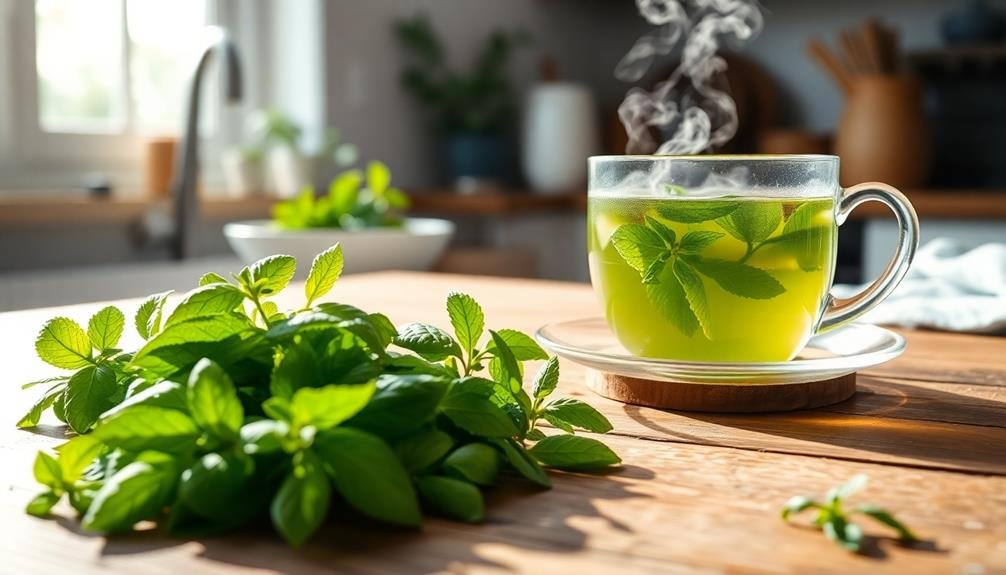
Combining the benefits of adaptogens with invigorating flavors, the Holy Basil and Mint infusion serves as a soothing alternative to Rhodiola Rosea lemon tea. This delightful blend not only uplifts your spirits but also helps you combat stress and enhance your overall well-being.
Holy Basil, known for its calming properties, pairs perfectly with revitalizing mint to create a balanced drink that invigorates your senses.
To make your Holy Basil and Mint infusion, follow these simple steps:
- Gather your ingredients: Use fresh or dried holy basil leaves and mint leaves.
- Boil water: Heat water to just below boiling point for the best flavor extraction.
- Steep: Add both herbs to the hot water and let them steep for 5-10 minutes.
- Strain and enjoy: Remove the herbs, pour into your favorite mug, and sip slowly.
This infusion is a great way to incorporate adaptogens into your daily routine.
Whether you enjoy it in the morning or as an afternoon pick-me-up, you'll find that holy basil and mint create a revitalizing, health-boosting experience that you'll crave time and again.
Reishi Mushroom Chai
In the evening, a warm cup of Reishi Mushroom Chai can be the perfect way to unwind and nourish your body. Known for its calming properties, Reishi mushroom, often called the "mushroom of immortality," helps reduce stress and promote better sleep.
To make this soothing chai, start by brewing black tea or a caffeine-free alternative. Next, add dried Reishi mushroom slices. If you can't find them, powdered Reishi works too.
Simmer your chosen tea with the mushroom for about 15 minutes to extract its beneficial compounds. Strain the mixture into a cup, and feel free to adjust the flavor with spices like ginger, cinnamon, or cardamom. These spices not only enhance the taste but also add their own health benefits.
Sweeten your chai with honey or maple syrup to taste, and finish with a splash of milk or a non-dairy alternative. Sip your Reishi Mushroom Chai slowly while reflecting on your day, allowing the adaptogenic properties to help you relax and recharge.
Enjoy this delightful ritual and embrace the calming effects of Reishi as part of your nightly routine.
Tulsi and Ginger Brew
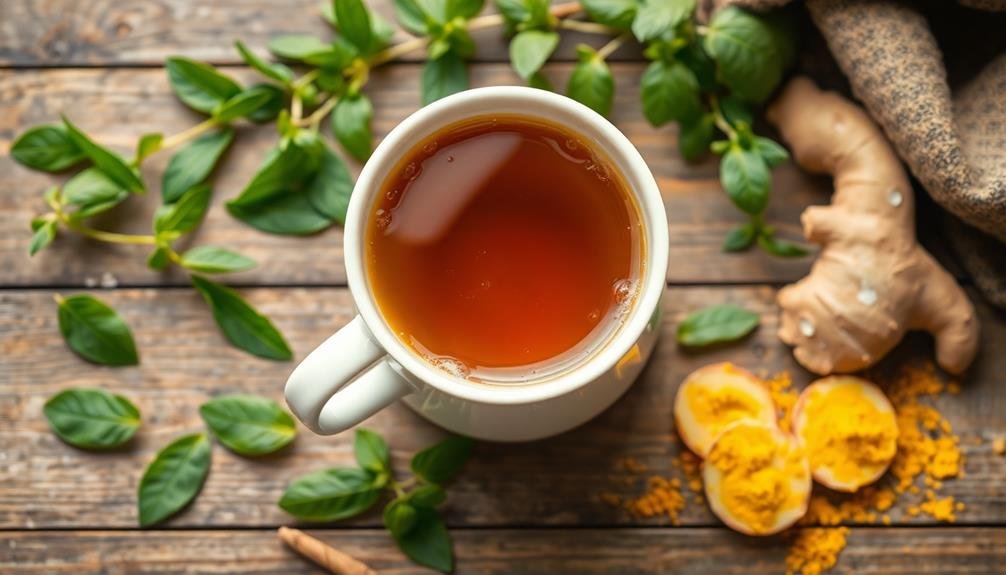
Tulsi and Ginger Brew brings together the powerful benefits of two revered herbs, creating a revitalizing drink that can support your immune system and enhance your mood.
Tulsi, also known as holy basil, is celebrated for its adaptogenic properties, helping your body adapt to stress. Ginger adds a zesty kick while promoting digestion and circulation.
To make this invigorating brew, you'll need just a few simple ingredients:
- Fresh tulsi leaves (or dried)
- Fresh ginger, sliced
- Water
- Honey or lemon (optional for sweetness)
Start by boiling water and adding the sliced ginger. Let it simmer for about 10 minutes to extract the ginger's essence.
Next, add the tulsi leaves and continue brewing for another 5 minutes. Strain the tea into your favorite mug, and if you like, stir in some honey or a splash of lemon for added flavor.
Enjoy this aromatic blend either hot or iced. Not only will it warm you up, but it'll also provide a soothing way to unwind after a long day.
Sip on this delightful concoction and feel the stress melt away!
Maca and Cinnamon Mix
Maca and cinnamon aren't just tasty; they pack a punch when it comes to health benefits.
You'll love how cinnamon adds warmth and depth to the earthy flavor of maca, making it a delightful drink.
Plus, preparing this mix at home is quick and straightforward, so you can enjoy it anytime you need a boost.
Health Benefits of Maca
When you're looking to boost your health naturally, incorporating a maca and cinnamon mix into your routine can be a game-changer. This powerful combination offers a range of health benefits that can enhance your well-being and liveliness.
Maca, a root vegetable from the Andes, is renowned for its adaptogenic properties, helping your body adapt to stress and fatigue.
Here are some health benefits you can enjoy:
- Increased Energy: Maca is known to provide a natural energy boost, making it perfect for those busy days.
- Hormonal Balance: It may help regulate hormonal levels, which can be particularly beneficial for women during their menstrual cycles.
- Enhanced Mood: Maca can support mental clarity and emotional stability, reducing feelings of anxiety and depression.
- Nutrient-Rich: Packed with vitamins, minerals, and antioxidants, maca contributes to overall health and immune support.
Cinnamon's Flavor Profile
With its warm, sweet, and slightly spicy notes, cinnamon adds a delightful depth to any blend, especially when paired with maca. This versatile spice not only enhances the flavors but also brings its own unique characteristics to the table.
You'll notice how cinnamon's rich aroma entices your senses, inviting you to take that first sip.
When you combine cinnamon with maca, you create a harmonious balance. The nutty, earthy flavor of maca complements cinnamon's sweetness, resulting in a rounded taste that's both comforting and energizing.
This mix can elevate your tea experience, making each cup a cozy ritual.
Cinnamon's slight spiciness can also awaken your taste buds, adding a layer of complexity to the drink. It's not just about the flavor; the warmth of cinnamon can create a sense of comfort, making your tea feel like a warm hug on a chilly day.
Whether you prefer it in a hot brew or an iced version, the combination of maca and cinnamon creates a satisfying drink that's sure to please your palate.
Explore this delightful pairing, and you'll find a new favorite in your adaptogenic tea repertoire.
Easy Preparation Steps
Start by gathering your ingredients: maca powder, ground cinnamon, water, and any sweetener you prefer. This simple mix not only tastes great but also offers a host of adaptogenic benefits. Here's how you can whip it up in no time.
- Heat the water: Boil about 2 cups of water in a pot or kettle.
- Combine the ingredients: In a separate bowl, mix 1-2 teaspoons of maca powder with ½ teaspoon of ground cinnamon.
- Add water: Once the water's boiling, pour it over the maca and cinnamon mixture. Stir well to guarantee everything dissolves completely.
- Sweeten it: If you want a sweeter taste, add honey, maple syrup, or your preferred sweetener to taste.
Now, let the tea steep for about 5 minutes to enhance the flavors.
Once it's ready, pour it into your favorite mug, sip, and enjoy the warm, comforting benefits of maca and cinnamon.
This tea not only warms you up but also boosts your energy and supports overall wellness.
You'll find it's an easy addition to your daily routine!
Schisandra Berry Iced Tea

Schisandra berry iced tea offers a revitalizing way to enjoy the unique flavors and health benefits of this adaptogenic fruit. Known for its tart and slightly sweet taste, schisandra berries are often hailed for their ability to enhance endurance and mental clarity.
To make this invigorating beverage, start by steeping dried schisandra berries in hot water for about 15 minutes. You'll want to use roughly one tablespoon of berries per cup of water.
Once the tea has steeped, strain out the berries and let the liquid cool. For an extra invigorating twist, you can add a squeeze of lemon or a drizzle of honey to enhance the flavor. Serve it over ice, and you'll have a delightful drink that's perfect for warm days.
If you'd like to elevate the health benefits, consider adding other herbs or adaptogens, like mint or lemon balm, which complement schisandra beautifully.
This iced tea not only quenches your thirst but also provides a range of antioxidants, making it a perfect addition to your wellness routine. Enjoy your homemade schisandra berry iced tea and feel the energizing effects!
Ginseng and Hibiscus Fusion
Ginseng and hibiscus make a powerful pair, blending health benefits with a delicious flavor profile.
You'll find that ginseng boosts your energy and resilience, while hibiscus adds a tangy, floral note to your brew.
Let's explore how to brew this fusion to maximize its effects and enjoyment.
Health Benefits of Ginseng
Exploring the health benefits of ginseng, especially when combined with hibiscus, reveals a powerful fusion that can enhance your well-being.
Ginseng is renowned for its adaptogenic properties, helping your body adapt to stress and promoting balance. When you mix it with hibiscus, you get a blend that not only tastes great but also packs a health punch.
Here are some key benefits of ginseng:
- Boosts Energy Levels: Ginseng can help reduce fatigue, giving you that extra energy boost you need throughout your day.
- Enhances Cognitive Function: It's known to improve focus and memory, making it easier for you to stay sharp and alert.
- Supports Immune Health: Ginseng may strengthen your immune system, helping you fend off infections and illnesses.
- Regulates Blood Sugar: Some studies suggest ginseng can help stabilize blood sugar levels, making it a good option for those concerned about diabetes.
Hibiscus Flavor Profile
When you combine ginseng with hibiscus, the resulting flavor profile is a delightful dance of sweet and tart. The vibrant, crimson hue of hibiscus not only captivates the eye but also brings a revitalizing tartness that perfectly complements the earthy, slightly bitter notes of ginseng. This fusion creates a balanced and invigorating tea experience that's perfect for any time of day.
Here's a quick breakdown of the flavor elements in this unique combination:
| Flavor Component | Description |
|---|---|
| Sweetness | Hibiscus adds a natural sweetness, enhancing the overall flavor. |
| Tartness | The tart edge of hibiscus provides a revitalizing zing. |
| Earthiness | Ginseng contributes an earthy, grounding taste to the blend. |
| Complexity | The interplay of these flavors creates a complex yet harmonious experience. |
Together, these elements create a revitalizing drink that not only tantalizes your taste buds but also offers potential health benefits. Enjoying this ginseng and hibiscus fusion can be a delightful way to elevate your tea-drinking ritual!
Brewing Techniques and Tips
To enjoy the delightful ginseng and hibiscus fusion, mastering the brewing process is key. Start by gathering your ingredients: high-quality dried hibiscus flowers and ginseng root. You can use either whole ginseng or powdered form, depending on your preference.
Here are some tips to enhance your brewing experience:
- Water Temperature: Use water just off the boil (around 200°F) for ideal extraction of flavors and nutrients.
- Steeping Time: Allow the mixture to steep for 5-10 minutes. This gives the hibiscus time to release its tartness and the ginseng its earthy tones.
- Proportions: A good starting point is one tablespoon of hibiscus to one teaspoon of ginseng per cup of water. Adjust to your taste.
- Add Sweeteners: If you prefer a sweeter drink, consider adding honey or agave syrup after brewing to balance the tartness of the hibiscus.
Once brewed, strain the tea and enjoy it hot or chilled. This fusion not only tastes amazing but also offers a range of health benefits, making it a perfect addition to your daily routine.
Happy brewing!
Frequently Asked Questions
What Are the Health Benefits of Adaptogenic Teas?
Adaptogenic teas offer numerous health benefits. They help reduce stress, boost energy, and enhance mental clarity. By incorporating these teas into your routine, you can support your body's natural ability to adapt to challenges and maintain balance.
How Often Should I Drink Adaptogenic Teas?
You should drink adaptogenic teas regularly, ideally once or twice daily. Listen to your body's response, adjusting frequency as needed. Consistency helps you reap the benefits, but remember to balance it with other healthy habits.
Can I Combine Different Adaptogenic Teas?
Absolutely, you can combine different adaptogenic teas! Experimenting with blends enhances flavors and benefits. Just be mindful of the properties each herb offers, so you can create a perfect balance tailored to your needs.
Are There Any Side Effects of Adaptogenic Teas?
Yes, adaptogenic teas can cause side effects like digestive issues, headaches, or allergic reactions, especially if you're sensitive to certain herbs. It's best to start with small amounts and monitor how your body reacts.
How Should I Store Leftover Adaptogenic Tea?
To store leftover adaptogenic tea, let it cool to room temperature, then transfer it to an airtight container. Keep it in the fridge and consume within three days for the best flavor and potency.
In Summary
By exploring these adaptogenic teas, you can easily craft soothing blends right at home. Each recipe offers unique benefits, from stress relief to energy boosts, making your tea time both delicious and nourishing. So, grab your favorite ingredients, experiment with flavors, and enjoy the calming effects of these powerful herbs. You'll not only enhance your wellness routine but also discover new favorites that you'll look forward to sipping every day. Happy brewing!

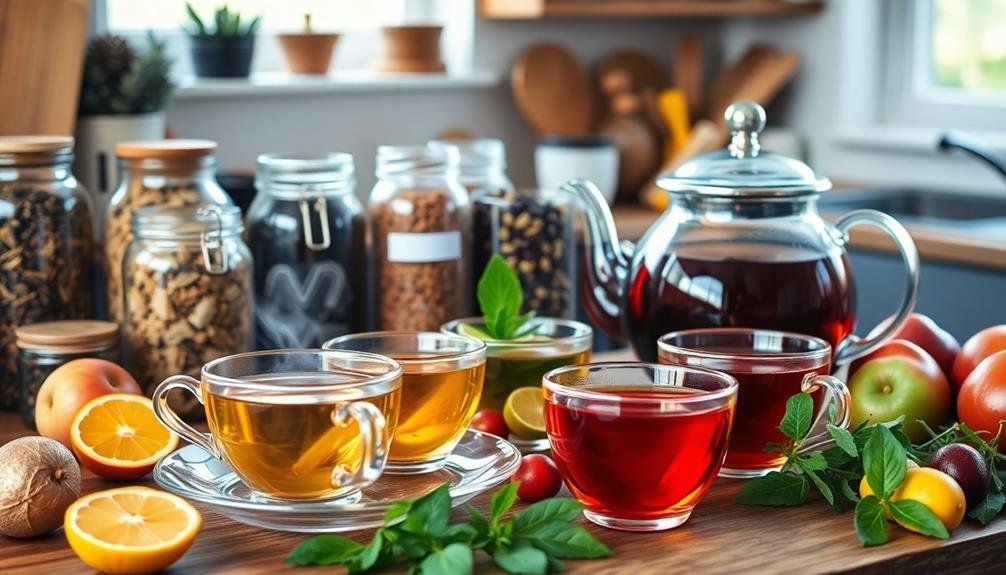
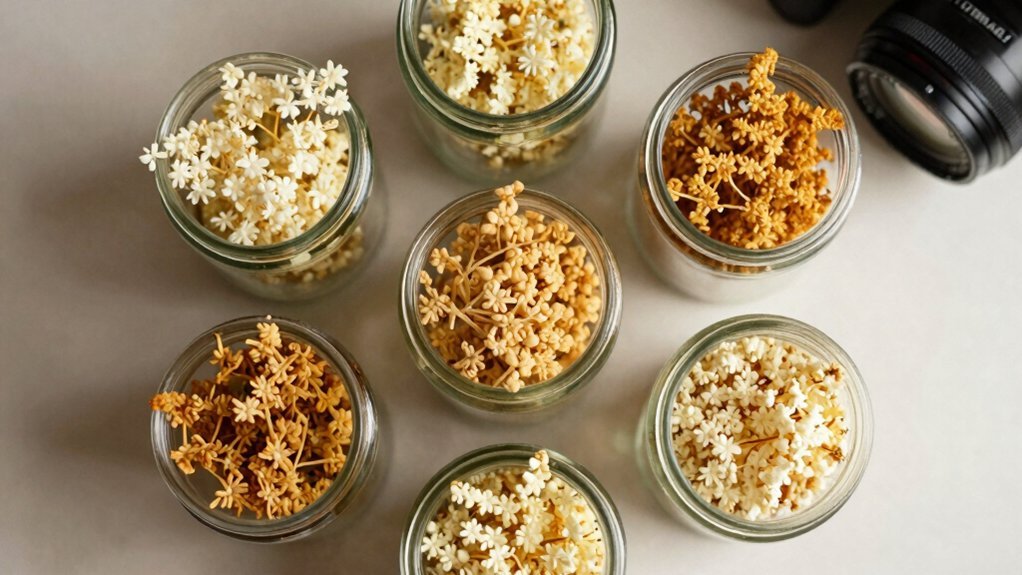

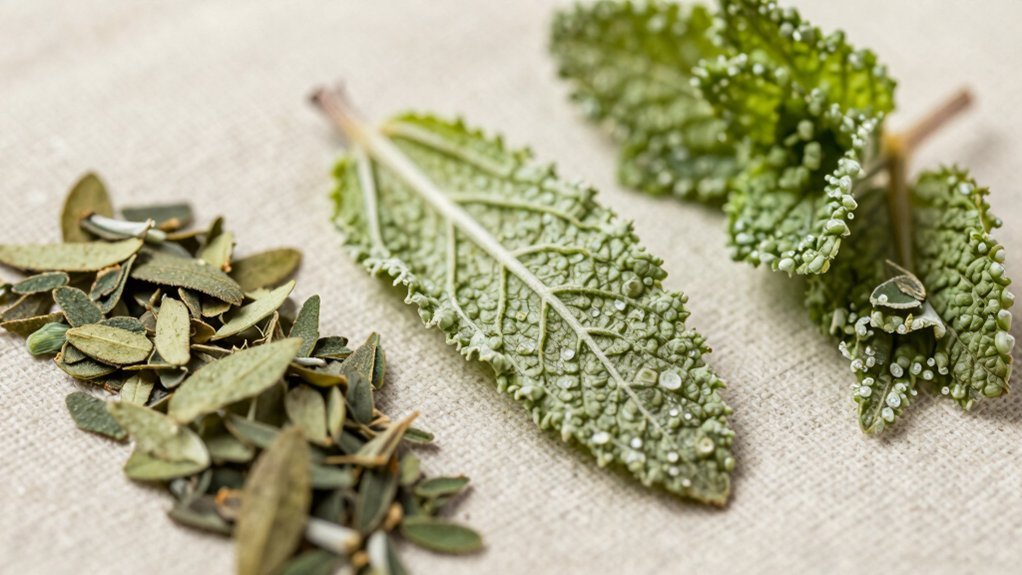
Leave a Reply